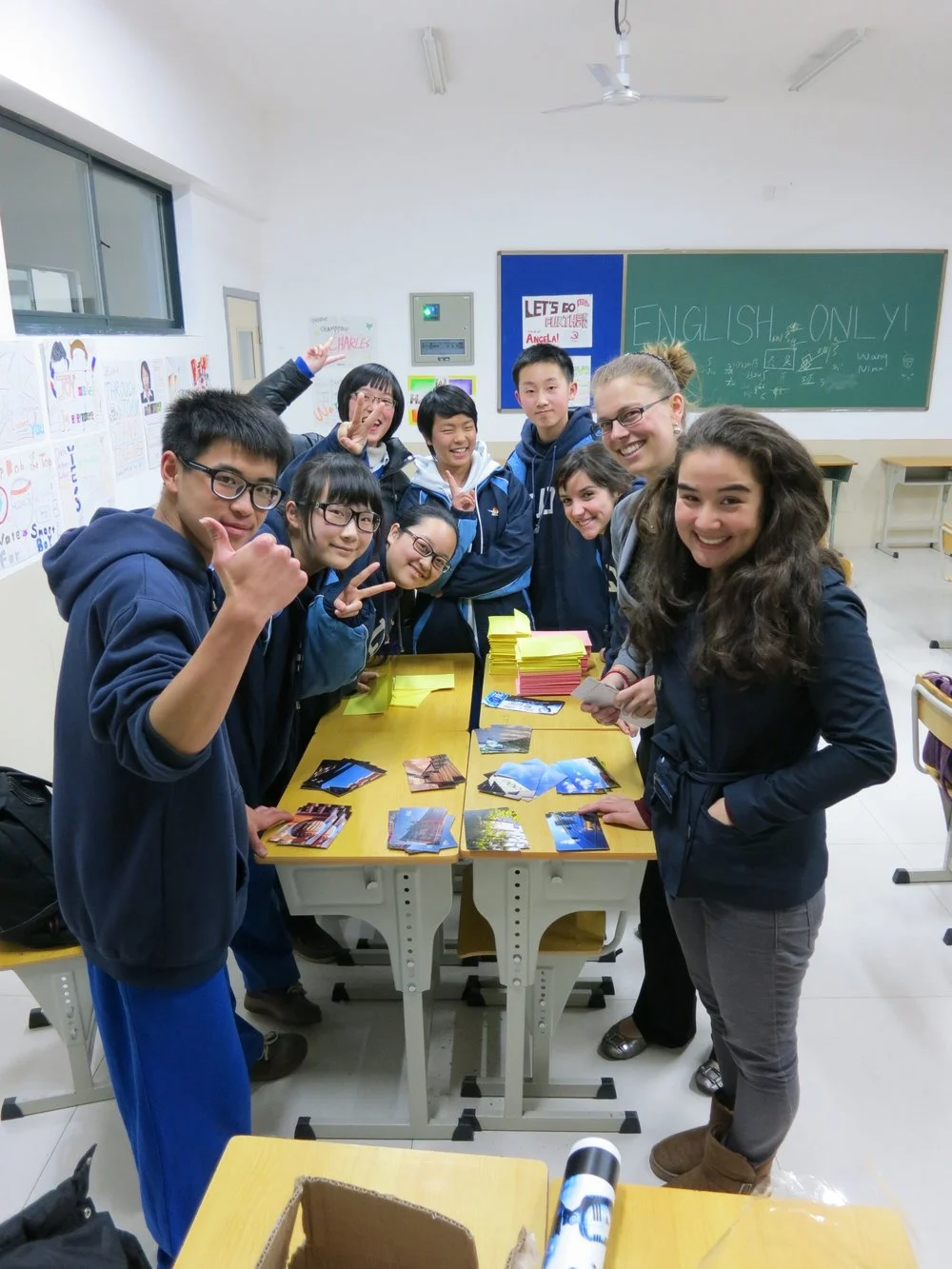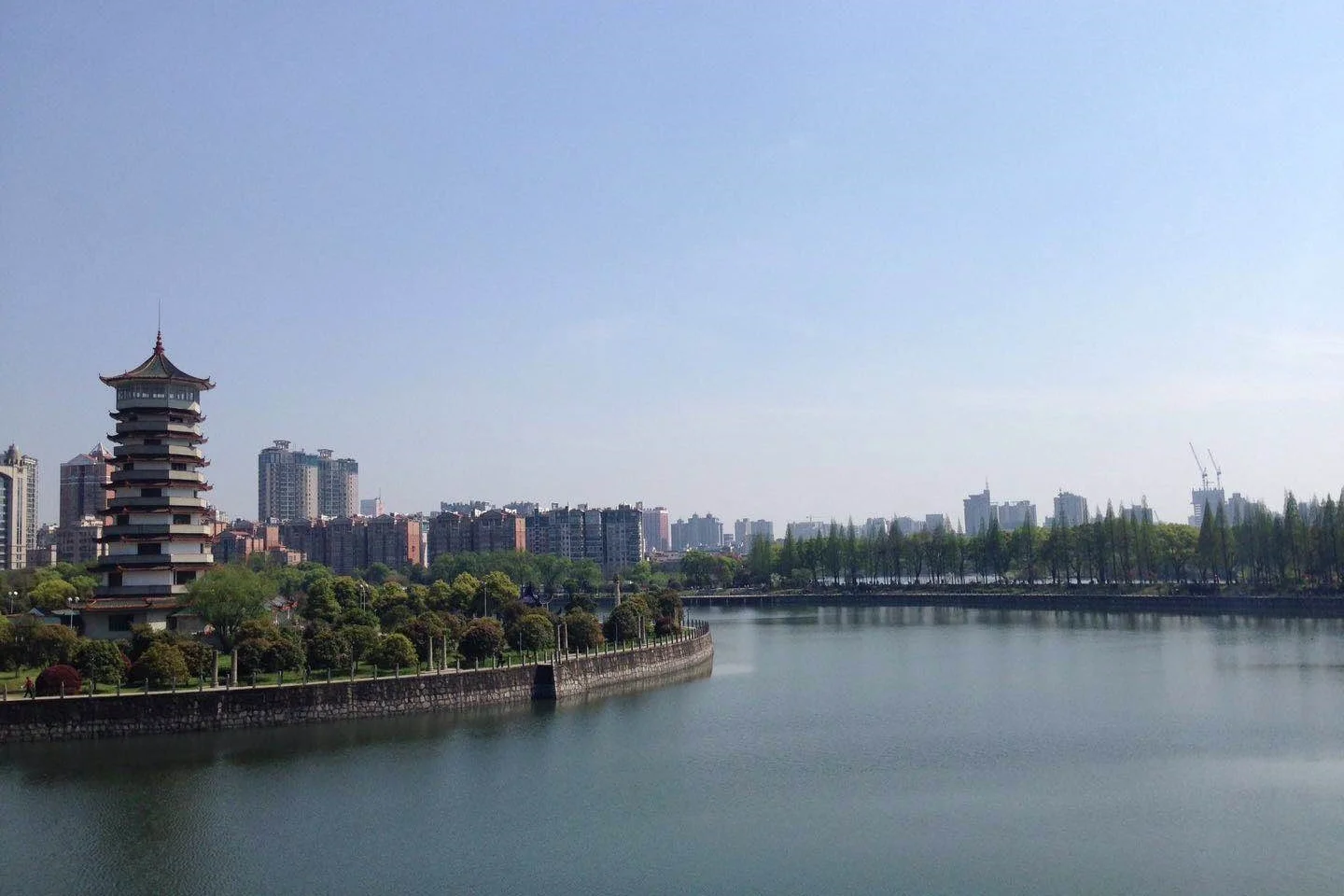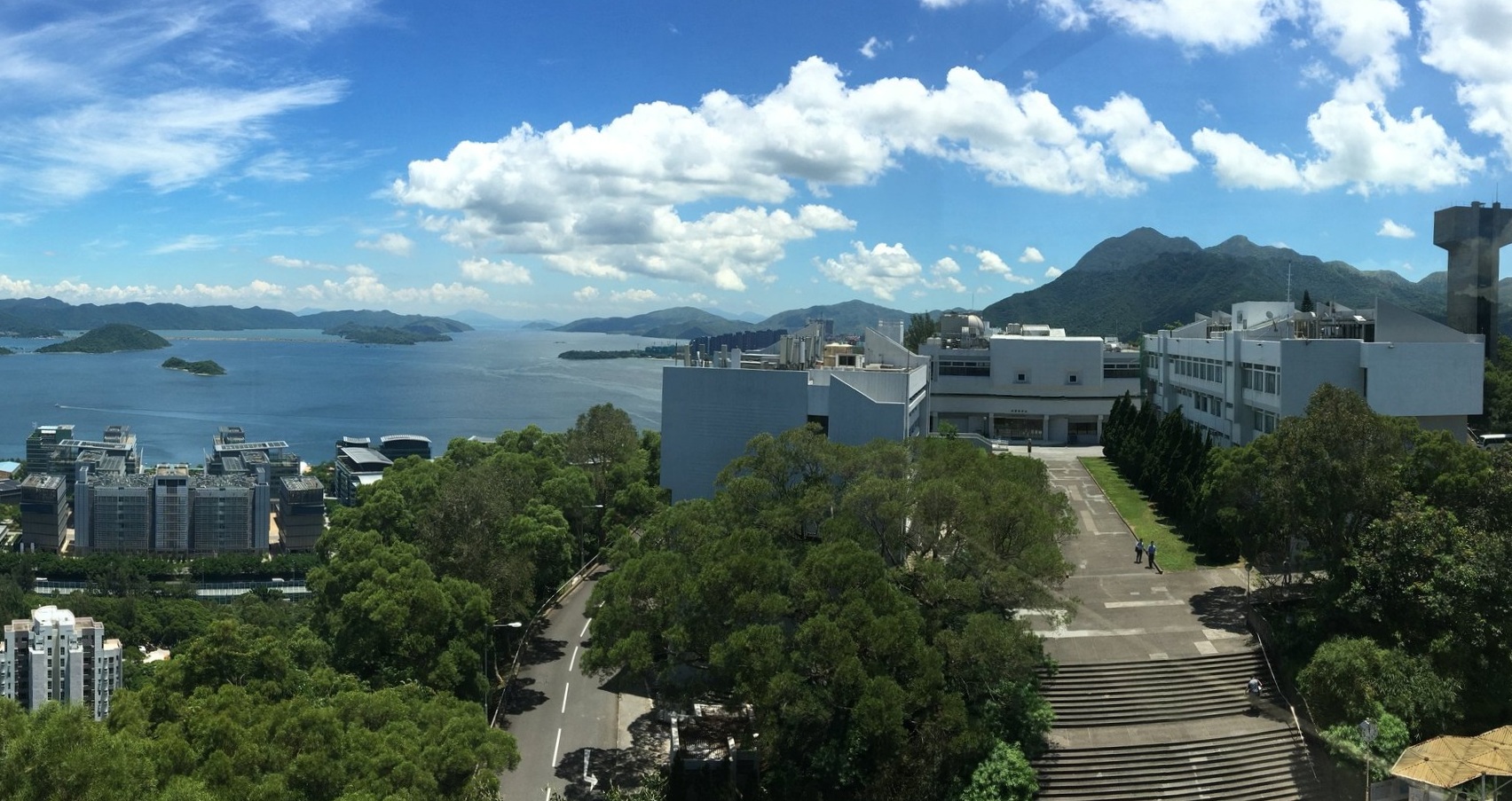Yale-China Fellowship Details
Use the menu below to explore the different areas of the Fellowship. If you still have questions or want more information, contact Education staff.

“The challenge of communicating and connecting across a significant cultural divide has made me a more careful clinician, researcher, and friend. I don’t assume that I get where someone is coming from until I’ve done some careful work first.”
Teaching
What level of students do Fellows teach?
Fellows at Xiuning and Yali High Schools teach the equivalent of high school sophomores and juniors, and Fellows at the Chinese University of Hong Kong teach foundation classes for undergraduate English students.
What classes do Fellows teach?
Fellows at Yali and Xiuning High Schools design their own curriculum for oral English instruction, often adapted through the cultural lens of an American classroom. Fellows at the Chinese University of Hong Kong design classes around the English department’s curriculum for literature, writing, and American Studies.
Do Fellows get teacher training?
All Fellows become TEFL-certified (Teaching English as a Foreign Language), receive year-round professional guidance, and attend three conferences each year to share best practices.
Do Fellows have freedom to plan their curriculum?
Fellows are encouraged to design their classes based on the goals of their school. CUHK Fellows have the arc of their curriculum set by the English Faculty but otherwise have the freedom to design their lessons. Fellows also have access to past lesson plans that have been successful for other Fellows.
How many hours a week do fellows teach?
Fellows average 10 hours of classroom time in addition to class prep and grading.
What makes the Yale-China Fellowship stand out from other teach in China programs?
The Yale-China Fellowship is built on more than a century of history; in fact many of the other programs out there are part of our legacy, having been founded and led by former Fellows. Over the decades, we have continually striven to ensure that our program remains a model for others to aspire to, so that Fellows are always at the vanguard of our area of work - work that consists not only of teaching, but of deeper thought about taking full advantage of the opportunity that is created when a recent Yale graduate goes to live in a Chinese community for two years.
Specific elements of the current program structure that set it apart include long-term, individually-forged relationships with our partner institutions in China; emphasis on engaging with the local community outside the classroom; and the level of support provided to Fellows to ensure they can achieve meaningful results in any areas of service, learning, and leadership they pursue.
How is a Chinese classroom different from an American one?
One of the major differences between a Chinese and American classroom is the number of students per class. Yali and Xiuning classrooms are often 70+ students per class, though Fellows split each of those classes into two separate classes to better simulate the experiences of an American classroom. The class schedule is usually more heavily scheduled in China with classes beginning as early at 6 am and ending with evening study hours until 9 pm.
Language Learning
Do Fellows get language training?
All Fellows will receive language training the first summer and have the opportunity to continue lessons with a language tutor at each site. Mainland Fellows attend CET in Beijing and Hong Kong Fellows study at the Chinese Language Center at CUHK. All Mainland Fellows study Mandarin and Hong Kong Fellows have the choice of Cantonese or Mandarin.
How much language do Fellows leave the Fellowship with?
Fellows will succeed in operating in Chinese, especially at Xiuning or Yali, because of the intense, immersive experience of being an embedded community member. Fellows will not only gain more nuanced and regional approaches in the language but also adopt an understanding of the workings and systems of Chinese society as an advanced speaker.
I want to learn Chinese. how is the Yale-China Fellowship different from Light Fellowship?
The Yale-China Fellowship offers the chance to experience the all-around personal growth that is characteristic of Yale without the confines of being a student.The Yale-China program pushes Fellows beyond the role of a student, however, challenging them to also take on roles as teachers, leaders, mentors, and friends - all roles that require the use of high-level Chinese in an immersive setting. The second year of the fellowship solidifies Fellows' abilities and ties to the community through all these roles, including a high level of fluency in Chinese language.
Does teaching English make it hard to learn Chinese?
Yale-China Fellows work closely with Chinese colleagues and students, making Chinese language acquisition a very important part of the fellowship. By engaging non-English-speaking colleagues and members of the local community, past Fellows have been extremely successful in learning both written and spoken Chinese.
I already speak Chinese. How will the Fellowship further my language skills?
Fellows who have previously studied Mandarin or Cantonese take a placement test and are placed in the class level most appropriate for their ability. Mainland-based Fellows study Mandarin and are enrolled in an intensive summer program at CET in Beijing. Hong Kong-based Fellows study Cantonese and are enrolled in an intensive summer Cantonese course that is taught on the campus of The Chinese University of Hong Kong. Hong Kong Fellows may also opt to study Mandarin instead of Cantonese.

“I joined [Yale-China] as a blithering idealist with an undefined urge to do good; I left Changsha as a realist, still idealistic but better equipped with tools to make a contribution. Everything I’ve done since then has been built on those skills.”

“I got to experience a dimension of humanity that does not exist in my own culture, corners of the heart that lie dormant in most Americans, but without which my life now would feel incomplete. ”
Life In China
What is life like in China and Hong Kong?
Apply and find out.
Where will I live?
All Fellows live on the campus of their school in shared households with their co-Fellows. Accommodations in all circumstances are considered the best housing in the region and sometimes a higher standard of living than other teachers’ housing. For more information about each site’s living space, see the site info section.
Is China safe?
China is for the most part very safe, and at times could even be safer than the United States. As with any travel, Fellows should exercise general caution and pay attention to their surroundings and the news. For more information regarding the safety of traveling/living in China, visit the United States State Department pages on China.
What do Fellows do besides teach?
Fellows have explored the spectrum of possibilities of free time in China: from traveling to all of the provinces, to learning how to pick bamboo with colleagues, to planning for a career in law, to studying the guzheng… The design of the Fellowship limits teaching to 12 hours maximum so that fellows can devote sufficient time to language acquisition, cultural exploration, hobbies, and professional development.
How do I get money in China or Hong Kong?
Most Fellows opt to start bank accounts near their schools and transfer a small amount to set up the account. At Yali and Xiuning, Fellows receive their paychecks by direct deposit. In many places in mainland China, cash is still the preferred method of payment for most businesses and vendors, though the introduction of mobile payments methods such as AliPay and WeChat Pay has offered cashless transactions.
Site Info
Xiuning High School 休宁中学 in Xiuning, Anhui Province
Roughly the size of New Haven, Xiuning is an exciting opportunity for Fellows to immerse themselves in a part of China most people only read about.
Xiuning County
Located in Anhui Province near Huangshan, one of China’s most celebrated mountain ranges
Famous for mountain landscapes, tea, architecture and culture
For the scholar, artist and outdoor enthusiast
Xiuning High School
Population of roughly 2,300 students
Students mostly of rural families and migrant workers
Named a “key” (model) school in 1952
Xiuning Apartment
Located on top of a hill with a sunny courtyard
Two apartments each shared by two Fellows
Each Fellow has a private room with heating and air conditioning with a private bathroom
Yali High School 雅礼中学 in Changsha, Hunan Province
Changsha is a chance for Fellows to continue the long legacy of Yale-China that begin over a century ago while being at the intersection of China’s storied history and rapidly developing future.
Changsha
Capital of Hunan Province
Known for its scholars, revolutionaries, spicy cuisine and television show production
For the historian, spice-lover and media enthusiast
Yali High School
Founded by Yale-China in 1906
Approximately 3,000 students
One of the “Famous Four” high schools in Changsha known for its top academic achievements
Changsha Apartment
Located less than 10 minutes walk from Yali High School
Modern and spacious four bedroom apartment
Each Fellow has a private room in the three bathroom apartment
New Asia College at Chinese University of Hong Kong 新亞書院香港中文大學 in Hong Kong
CUHK Fellows are able to dive beyond the Western façade into a community where Chinese traditions, habits and social interactions thrive.
Hong Kong
Home to 7 million residents who live on roughly 34 of 430 square miles
Comprised of over 200 picturesque and hike-friendly islands
For the hiker, sociologist and foodie
New Asia College at CUHK
Partnered with Yale-China in 1953
11,000 undergraduate and 3,000 graduates
280 acre hillside campus located in the New Territories with mountain and sea views
Hong Kong Apartment
Located on the CUHK campus at the top of the hill
Known as “Friendship Lodge”
Four bedroom, two bathroom apartment with views of Tolo Harbor

Xiuning

Changsha

Hong Kong

“I can draw a direct line between my time in Yale-China and the aspects of my life that I most love today: my spouse, my career in law, and my interest in Chinese society and culture.”
Beyond the Fellowship
What do Fellows do after the Fellowship?
Fellows engage in a variety of careers after the Fellowship including but not limited to China related fields. To learn more about the potential career paths after the Fellowship, visit our Alumni Page.
How does the Fellowship help my future career path?
The Fellowship may seem like it is only for those interested in entering into a China-related field, but the Fellowship is provides Fellows with skills, resources and networks for any and every field. With Fellows in finance, medicine, law, tech and more, Fellows find that the Fellowship provides a foundation, skills and the network to excel in whatever field they choose.
What transferable skills do Fellows learn during the Fellowship?
Teaching is a job that hones skills used in almost every field. Fellows learn to communicate complex ideas in clear ways, lead and engage different groups of people, and work across cultures and perspectives. In an ever increasingly global world, the experience of working and living abroad for two years is invaluable. Fellows also receive language certification from TEFL and gain professional proficiency in Chinese.
Do Fellows receive professional development and/or career advice?
Three conferences are held each year for Fellows to exchange ideas, learn from each other and develop skill for post-Fellowship. Additionally, all Fellows are paired with a mentor. Mentors are assigned based on the interests of the Fellow. Finally, Fellows are part of an ever-growing network of remarkable people. Tapping into this network gives Fellows the chance to explore professional interests with those who have also experienced living and working in China.
Applying for the Fellowship
What is the application process?
All applicants must submit a complete application by the deadline. Applicants will then be invited to a group interview and subsequently an individual interview. For first round applicants, group interviews are usually held during Reading Week in December, and individual interviews are held in late January with offers going out by mid February. For second round applicants, group interviews are held after Spring Break and individual interviews are held in early April with offer letters out by mid April.
Can international students apply?
International students with native-speaker level English are welcome to apply to the program. Unfortunately, we cannot accept candidates who possess lower than native-speaker fluency for this program.
Do I need to have studied China and Hong Kong or have Chinese language ability?
Although many applicants have already studied Chinese or have taken China-related coursework, a background in China or Chinese is not required. There are places in the application where you have the opportunity to discuss why you want to go to China at this time in your academic/professional career.
I have not taken a language course at Yale. What do I do about the language teacher recommendation requirement?
The summer language programs that Yale-China Fellows attend require a recommendation from a foreign language instructor. If you have not taken a foreign language at Yale, you must submit a recommendation from a high school foreign language instructor instead. In addition, gaining proficiency in Chinese is an essential part of this fellowship, and the selection committee is interested in considering your track record as a student of foreign languages.
